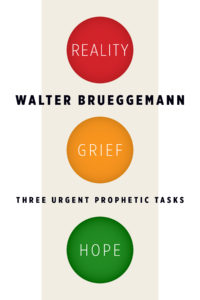Reality, Grief, Hope: Three Urgent Prophetic Tasks
 I recently finished my second book from the theologian Walter Brueggemann. I was blown away when I read The Prophetic Imagination last year (see: blog review). This time I worked my way through his book Reality, Grief, Hope: Three Urgent Prophetic Tasks (see: Amazon link). It’s a bit of a strange title and an even more unique premise. Brueggemann compares the fall of Jerusalem to Babylon with the attacks on America on September 11th. What links these two together is a strong sense of exceptionalism that was dramatically shattered in each example. As a result, he argues that“The prophetic task, in our contemporary society as in ancient Jerusalem, is to counter the governing ideology, in both cases that of exceptionalism.”
Brueggemann contrasts the flow of ideology-denial-despair with the counterpoint of realism-grief-hope. The first three (ideology–>denial–>despair) is the method of empire and this is what leads to an overdeveloped sense of exceptionalism. But it works only until it doesn’t. That’s where the fall of Jerusalem and the 9/11 attacks ushered in a new opportunity to escape the normal thought process and enter into a time of realism–>grief–>hope. Our choice today is to continue the first cycle or learn to embrace the prophetic call of the second.“9/11 is a symbol and an epitome of the wide and deep loss now faced in our society that requires rethinking from the ground up.” One will cause us to live in a perpetual sense of despair while the other offers a robust sense of hope. Brueggemann sees these three prophetic tasks laid out in the Old Testament:
I recently finished my second book from the theologian Walter Brueggemann. I was blown away when I read The Prophetic Imagination last year (see: blog review). This time I worked my way through his book Reality, Grief, Hope: Three Urgent Prophetic Tasks (see: Amazon link). It’s a bit of a strange title and an even more unique premise. Brueggemann compares the fall of Jerusalem to Babylon with the attacks on America on September 11th. What links these two together is a strong sense of exceptionalism that was dramatically shattered in each example. As a result, he argues that“The prophetic task, in our contemporary society as in ancient Jerusalem, is to counter the governing ideology, in both cases that of exceptionalism.”
Brueggemann contrasts the flow of ideology-denial-despair with the counterpoint of realism-grief-hope. The first three (ideology–>denial–>despair) is the method of empire and this is what leads to an overdeveloped sense of exceptionalism. But it works only until it doesn’t. That’s where the fall of Jerusalem and the 9/11 attacks ushered in a new opportunity to escape the normal thought process and enter into a time of realism–>grief–>hope. Our choice today is to continue the first cycle or learn to embrace the prophetic call of the second.“9/11 is a symbol and an epitome of the wide and deep loss now faced in our society that requires rethinking from the ground up.” One will cause us to live in a perpetual sense of despair while the other offers a robust sense of hope. Brueggemann sees these three prophetic tasks laid out in the Old Testament:
- “Jeremiah is the great voice of realism against the ideology of Jerusalem.”
- “Lamentations is the most compelling performance of grief that precludes denial in that ancient tradition.”
- “2Â Isaiah is the best known and most eloquent voice of hope in ancient Israel that counters despair.”
Both Presidents Bush have said exactly the same thing, the first at the Earth Summit in 1992, the second after September 11, 2001: “The American way of life is not up for negotiation.†They were not aberrant in this, or partisan. We will do all we need and can to keep the American way of life as American Affluence from the negotiating table. With our inordinate power, that means an imperial posture virtuously clad in an ideology of democratic capitalism, with freedom and prosperity the promise and the lure.
The destruction of Jerusalem in 587 b.c.e. at the hands of the Babylonians constituted the defining experience of ancient Israel given us in the Old Testament.
The prophets are voices of unrelenting realism in the face of deceiving ideology.
Prophetic realism is always juxtaposed to ideological deception.
Militarization of our society, in the name of security or of patriotism, serves to assure perpetual war in order to maintain supremacy in the world.
To some great extent, I judge that our society lives in a bubble of illusion that is addicted to certain ideas that are remote from the lived reality that is all around us. In our situation, I judge, much like that of ancient Jerusalem, we are unable to see, to notice, or to take seriously the social reality in front of us.
The prophetic task now, in contemporary U.S. society, is exactly to perform hope that is characteristically a tenacious act of imagination, grounded in a dream, song, narrative, or oracle, rooted in the elusive but faithful authority of God. The prophet is the one who dares to speak such a future that is out beyond all evidence. The work is not simply to reiterate old acts of hope, but to be informed by such old acts in order to perform acts that may be grounded in divine initiative.
Do You Want to Read the Bible Without Falling Behind?
Sign up your email and I’ll send you a PDF to download and use my custom-made reading plan system. There’s no way to fall behind on this system and every day will be different no matter how long you use it!
I’ll send future content directly to your inbox AND you can dive into the Bible like never before.




